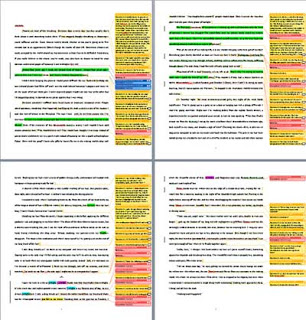There is no easy answer to this question and no road map for you to follow.
Just so we’re clear.
There are, however, steps you can take and things you can try that might get you one step closer to publication. Agent Rachelle Gardner offers some tips, but no one can make you promises. Other agents and bloggers have as well and, in a nutshell, their combined advice is as follows.
One, improve your writing. In fact, this is kind of a must. If your book is not absolutely the best you can make it, don’t even think about submitting it and please, please step away from thoughts about self-publishing. For advice on how to improve without spending a lot of money, check out Elizabeth Spann’s post or my version of the same.
Two, enter contests. I mentioned this in my post on improving, but it’s a subject that is worth repeating. Romance Writers of America has a list of contests for 2012 here (chapter hosted contests) including a few for unpublished manuscripts. Many others exist for both published and unpublished authors and a Google search can help you turn up ones relevant to your genre.
Three, fine-tune your query letter, but stay away from query-letter services. I’ve read from multiple reliable sources that most agents can instantly spot a pre-fab query letter and using one of these will not get you on their good side. Free services for query letter critiques include sites like Critique Circle and Query Shark that can provide edits once you have a letter written, but if you’re struggling to get a solid letter on paper (or on computer) try one (or a few) of these resources:
- Agent Query – How to Write a Query Letter
- Query Shark – just reading through the posts can be enormously helpful
- Writer Beware Blogs – How to Write a Query Letter
- Nathan Bransford – How to Write a Query Letter
These are just a few of the thousands of sites available, but they are sites I know are reputable and thorough. The advice they offer is more valuable than gold and you should treat it as such.
Four, find an agent to query. Do your research and don’t bother querying agents who A) aren’t accepting submissions, B) don’t represent your genre, C) show up on Writer’s Beware, D) ask for money before reading your query, E) don’t follow the guidelines of the Association of Authors’ Representatives (AAR). They don’t have to actually be a member of the AAR, but even those who aren’t should follow the ethical guidelines established by this organization. To find an agent you should do some Google searches or search through the databases of Agent Query (free) or Writer’s Market (subscription required). These sources include most of the agents currently working in the industry and will be invaluable in your search.
Five, attend conferences and pitch sessions. You can do a Google search for conferences in your area, but unless you live in New York or California, you will probably have to travel for most of the major events. Personally, I hope to attend the RWA conference, the New York Book Expo, and the NYC Pitch and Shop Conference in 2012. These types of conferences are a fantastic way to meet other writer and industry professionals and maybe start forming a network. Often, skill alone isn’t enough. A single recommendation can go a long, long way.
Six, think positive. This may seem silly, but it’s important. Crucial, even. Getting published can be a long, winding, uphill road and letting yourself feel negative is one step closer to letting yourself quit. If you want it bad enough, you’ll get there come hell or high water. Just remember that each rejection you get is one closer to an acceptance and each bad review is one more way you can make your work better.
This probably seems like a lot of work. That’s because it is. There is another route to publication, the DIY path, but since the weight of every single decision rests on your shoulders, you have to make sure you do your research before committing to this. J.A. Konrath has a lot of information on his blog about self-publishing even if he sometimes phrases his opinions in ways that tend to offend. Not me, but I’ve seen it happen. New sites with advice or offers of publishing services are popping up every day, but do your research before signing with a company. It’s free to load your ebook onto Amazon or Barnes & Noble, so don’t pay for anything you don’t have to. This is a very valid option, but not one I’ve done a ton of research on, so I can’t offer much more advice on the subject. Not anything that I’ve personally tested, anyway.
So, here it is. Hopefully, it helps someone. Satisfaction is in no way guaranteed, but it’s a possibility.
Like this:
Like Loading...


